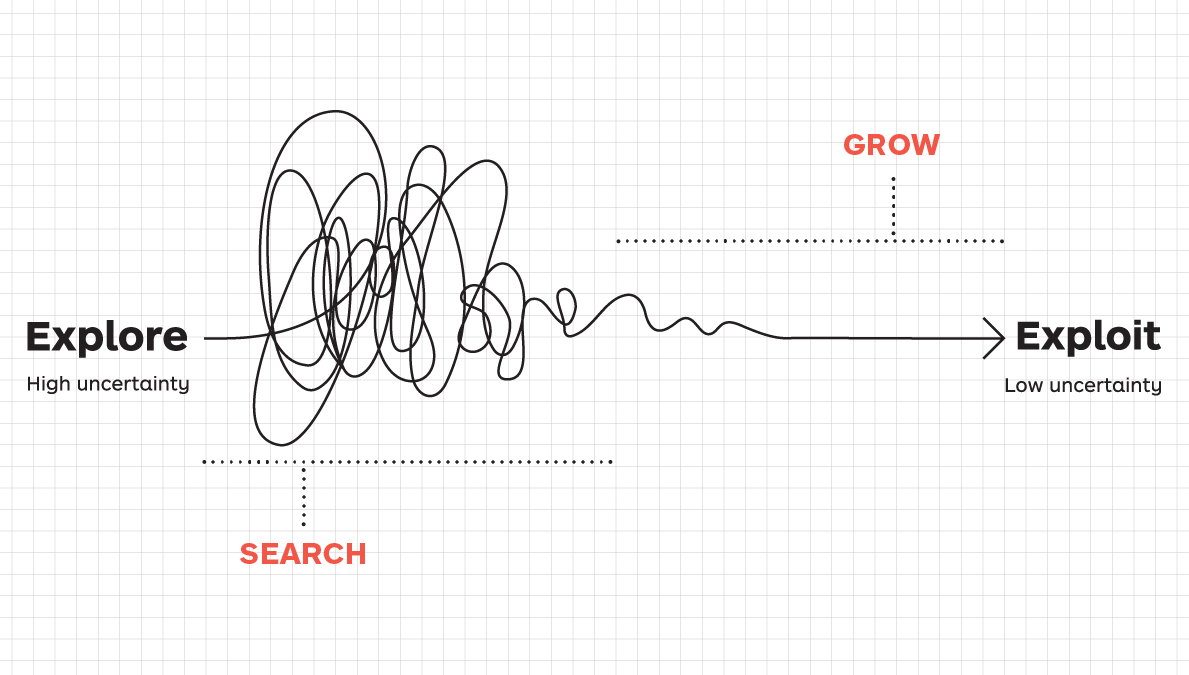We’re continuing our Algorithms to Live By series after a good response to our last newsletter! It’s good to be back, and I’m excited to dive into another fascinating concept from the book.
Every decision we make comes down to a simple choice: stick with what we know or venture into the unknown. Should you return to your favourite restaurant or try a new one? Should you stay in your current job or look for new opportunities? Should you binge-watch a familiar show or start something new? This tension between playing it safe and taking a risk is at the heart of the Explore vs. Exploit trade-off—a concept that helps us make better decisions in uncertain situations.
Explore vs. Exploit is an algorithm used in decision-making, especially in fields like artificial intelligence, but it’s just as useful in real life when deciding whether to gather new information or rely on what we already know.
What Is the Explore vs. Exploit Dilemma?
At its core, the Explore vs. Exploit dilemma is about when to try something new and when to stick with what works. The more time you have left to benefit from a decision, the more exploration makes sense. The less time you have, the more you should focus on exploiting the best-known option.
A few examples:
Food Choices – If you just moved to a new city, you might want to try many restaurants (explore). But if you’re about to leave soon, it’s smarter to go back to your favourite (exploit).
Job Hunting – Early in your career, you should explore different jobs, industries, and roles. Later on, it makes more sense to double down on what has worked for you.
Travel Planning – Should you revisit your favourite vacation spot or explore a new destination? If you only travel once a year, the decision becomes even trickier.
Streaming Shows – Do you watch something new or stick to the comfort of a familiar favourite? If you have limited time, you might prefer something reliable.
The algorithm suggests that exploration is more valuable when you have more time ahead of you, while exploitation is better when time is running out.
The Ideal Balance
So how do you decide when to explore and when to exploit? Here are a few rules of thumb:
✅ If you’re at the beginning of something (career, city, hobby), explore as much as possible. Gather data, try new things, and widen your perspective.
✅ As you get older or more experienced, start exploiting what has worked well. Focus on depth rather than breadth.
✅ Use time as a factor. The longer you have to enjoy the decision’s benefits, the more exploring is worth it. The shorter the time, the more exploitation makes sense.
✅ Trust randomness sometimes. In cases where you’re stuck between two choices, let chance decide for you. Flip a coin, roll a dice—sometimes, it doesn’t matter as much as we think.
Where It Works (And Where It Fails)
The Explore vs. Exploit framework is incredibly useful in many real-life situations, but it’s not a one-size-fits-all solution. Here’s where it shines and where it might not be as effective:
Where It Works
✅ Business & Startups – Early on, companies should experiment with different strategies, markets, and products. Once they find a successful model, they should exploit it.
✅ Education & Learning – When learning a new skill, it’s better to explore different methods and topics before narrowing your focus to mastery.
✅ Investing – Young investors should diversify (explore), while those closer to retirement should stick to stable returns (exploit).
Where It Might Fail
❌ Decisions with High Costs of Failure – If the risk of failure is high (e.g., medical treatments, life-altering choices), exploration can be dangerous.
❌ Overthinking Everyday Decisions – Sometimes, deciding whether to explore or exploit isn’t worth the effort (e.g., what to eat for lunch).
❌ Social Relationships – While meeting new people is great, always exploring without committing can leave you without meaningful connections.
Recommended Reads
If this concept intrigues you, here are some great resources to dive deeper into Explore vs. Exploit:
How AI Uses Explore vs. Exploit – The way machines balance learning and action. https://towardsdatascience.com/multi-armed-bandit
Why Trying New Things Is Hard (But Important) – Psychological barriers to exploration. https://nesslabs.com/exploration-vs-exploitation
The Power of Experimentation in Life and Business – Real-world applications of exploration. https://hbr.org/2020/03/the-science-of-choosing-when-to-try-something-new
So, what’s your next move? Will you explore a new option or stick with a trusted favourite? Let me know—I’d love to hear your take on this timeless decision-making dilemma!


